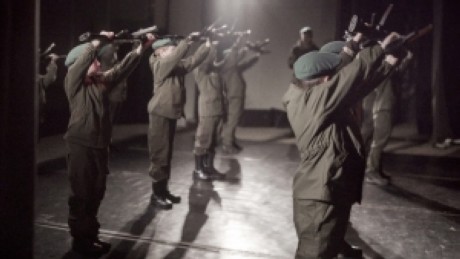


Ksenia Okhapkina: Immortal

This film had its world premiere at the Karlovy Vary Festival that ends tomorrow, July 6. It has had three screenings, and let me start this review of a film, that will conclude with the highest marks on this site by quoting the catalogue text of the festival:
” How do the mechanisms of political power directly influence the lives of a country’s inhabitants? In seeking an answer to this difficult question, this cinematic essay looks at everyday life in a small Russian industrial city, uncovering along the way how dangerous and furtive an all-permeating ideology can be.”
… saying that there is nothing wrong in the text, it is also about indoctrination and building up patriotism, but not about everyday life, the text is a simplification that makes you think that here comes another social documentary from Russia, one of the many that fills festival programs all over. No, this is Cinema far away from information and much closer to interpretation of human life through sound and image and editing and point of view. It is seldom that I see a film that so precisely invites you into a world conveyed via symbols and sequences that has a flow of scary beauty that hits your eyes. Russian Sergey Dvortsevoy once said that for him every image, every sequence must have energy – in Ksenia Okhapkina’s film this is the case. The film is a composition, you are linked to the film with your eyes and ears, it is brilliant.
It takes place in the area, where there used to be Gulag camps and where there now live people, where coal is transported in containers attached to trains in an Arctic landscape, where the ice is burnt away from the pavement and where kids are trained to use rifles, girls are doing ballet and march – 1,2,3,4 – and where a golden tree stands with appartment buildings in the background. Where pilot training is talked about in a museum of heroes, who died for the Fatherland. You have a focus on kids listening and watching a propaganda film, where we the audience hear the sentence “the path to immortality”. Hence the title. Where people are filmed like shadows from behind, they are anonymous individuals, who have given up… no let me refrain from my interpretations to avoid simplifications… in a film that has the total ambition to let the images and the sound speak for what you take from it. Don’t say it, show it! And yet the lonely snow-covered dog barking represents of course, what the director and her excellent crew of camerapersons and editors and sound people and composers want to tell the audience, bringing with extraordinary cinematic skills a tone and a point of view the film to a thematically existential level. As did Pirjo Honkasalo years ago with her “Three Rooms of Melancholy”. It’s in that category, wrote the overwhelmed Danish reviewer.
Estonia/Latvia, 2019, 60 mins.